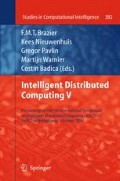Abstract
While Multi Agent Systems (MAS) attracted a great deal of attention in the field of software engineering, with its promises of capturing complex systems, they remain far away from commercial popularity mainly due to the lack of a MAS methodology that is accessible for commercial developers. In this paper we present a practical method for developing MAS that we believe will enable not only software developers but also business people beyond the academic community to design and develop MAS easily.
Access this chapter
Tax calculation will be finalised at checkout
Purchases are for personal use only
Preview
Unable to display preview. Download preview PDF.
References
van der Aalst, W.M.P., Pesic, M.: DecSerFlow: Towards a truly declarative service flow language. In: Proc. 3rd Int. Workshop on Web Services and Formal Methods. Springer, Heidelberg (2006)
Bresciani, P., Giorgini, P., Giunchiglia, F., Mylopoulos, J., Perini, A.: Tropos: an agent oriented software development methodology. J. Autonomous and Multi-Agents (2003)
DeLoach, S.A., Wood, M.F., Sparkman, C.H.: Multiagent systems engineering. Int. Journal of Software Engineering and Knowledge Engineering 11(3), 231–258 (2001)
Degnum, F., Morley, D., Sonenberg, E.A.: Towards socially spphisticated BDI agents. In: DEXA Workshop, pp. 1134–1140 (2000)
Edmunson, S.A., Botterbusch, R.D., Bigelow, T.A.: Application of System Modelling to the Development of Complex Systems. In: 11th IEEE/AIAA Proceedings of the Digital Avionics Systems Conference, vol. (5-8), pp. 138–142 (1992)
Jennings, N.R.: Commitments and conventions: The foundation of coordination in multi-agent systems. The Knowledge Engineering Review 8(3), 223–250 (1993)
Luck, M., McBurney, P., Preist, C.: Agent Technology: Enabling Next Generation Computing (A Roadmap for Agent Based Computing). AgentLink (2003)
Luck, M., Griffiths, N., d’Inverno, M.: From agent theory to agent construction: A case study. In: Jennings, N.R., Wooldridge, M.J., Müller, J.P. (eds.) ECAI-WS 1996 and ATAL 1996. LNCS, vol. 1193, pp. 49–64. Springer, Heidelberg (1997)
Padgham, L., Winikoff, M.: Prometheus: A methodology for developing intelligent agents. In: Giunchiglia, F., Odell, J.J., Weiss, G. (eds.) AOSE 2002. LNCS, vol. 2585, pp. 174–185. Springer, Heidelberg (2003)
Sudeikat, J., Braubach, L., Pokahr, A., Lamersdorf, W.: Evaluation of Agent–Oriented Software Methodologies – Examination of the Gap Between Modeling and Platform. In: Odell, J.J., Giorgini, P., Müller, J.P. (eds.) AOSE 2004. LNCS, vol. 3382, pp. 126–141. Springer, Heidelberg (2005)
Wijngaards, N.J.E., Kempen, M., Smit, A., Nieuwenhuis, K.: Towards Sustained Team Effectiveness. In: Boissier, O., Padget, J., Dignum, V., Lindemann, G., Matson, E., Ossowski, S., Sichman, J.S., Vázquez-Salceda, J. (eds.) ANIREM 2005 and OOOP 2005. LNCS (LNAI), vol. 3913, pp. 35–47. Springer, Heidelberg (2006)
Wood, M.F., DeLoach, S.A.: An Overview of the Multiagent Systems Engineering Methodology. In: Ciancarini, P., Wooldridge, M.J. (eds.) AOSE 2000. LNCS (LNAI), vol. 1957, pp. 207–221. Springer, Heidelberg (2001)
Wooldridge, M.: The Logical Modelling of Computational Multi-Agent Systems, PhD thesis, Department of Computation, UMIST, Manchester, UK (1992)
Wooldridge, M.J., Jennings, N.R., Kinny, D.: The Gaia methodology for agent-oriented analysis and design. Journal of Autonomous Agents and Multi-Agent Systems 3(3), 285–312 (2000)
Zambonelli, F., Jennings, N.R., Wooldridge, M.: Developing multi-agent systems: The Gaia methodology. ACM Transactions on Software Engineering and Methodology 12(3), 317–370 (2003)
Author information
Authors and Affiliations
Editor information
Editors and Affiliations
Rights and permissions
Copyright information
© 2011 Springer-Verlag Berlin Heidelberg
About this paper
Cite this paper
Elakehal, E.E., Padget, J. (2011). A Practical Method for Developing Multi Agent Systems: APMDMAS. In: Brazier, F.M.T., Nieuwenhuis, K., Pavlin, G., Warnier, M., Badica, C. (eds) Intelligent Distributed Computing V. Studies in Computational Intelligence, vol 382. Springer, Berlin, Heidelberg. https://doi.org/10.1007/978-3-642-24013-3_3
Download citation
DOI: https://doi.org/10.1007/978-3-642-24013-3_3
Publisher Name: Springer, Berlin, Heidelberg
Print ISBN: 978-3-642-24012-6
Online ISBN: 978-3-642-24013-3
eBook Packages: EngineeringEngineering (R0)

